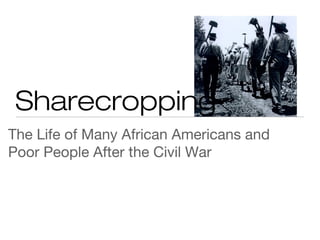
Reconstruction unit lesson 3 - sharecropping - power point
- 1. Sharecropping The Life of Many African Americans and Poor People After the Civil War
- 2. Objective •By the end of the lesson, SWBAT explain how sharecropping hurt the freed slaves.
- 3. Lightning Round Review •What amendment made slavery illegal in America? •What amendment gave all men the right to vote? •What was the purpose of the Freedman’s Bureau?
- 4. Freed Slaves - Education •After the Civil War, freed slaves were not educated. •Freed slaves were not educated because they never went to school when they were slaves. •Many freed slaves did not know how to read, write, or do basic Math.
- 5. Options •If you were a freed slave and you never went to school as a child, what jobs would you actually be able to do?
- 6. Options •Many former slaves had to get jobs that were similar to what they did during slavery. •Working on farms •Sewing •Cleaning houses
- 7. Plantations •A lot of the big plantations that were around before the Civil War had to be split up and sold to many people because the old plantation owners could not afford to keep the plantation up without slaves.
- 9. Plantations •Some big plantation owners saw that newly freed slaves and poor people wanted to start their own small farm to support their families. •These plantation owners decided to let former slaves work on the land in exchange for rent and some of the profits that the former slaves and poor people would make from selling the cotton.
- 10. Sharecropping •Sharecropping was a system where a plantation owner let freed slaves or poor people work on their land in exchange for rent and part of the profits that were made when the former slaves of poor people sold the cotton.
- 11. Sharecropping •Break it down! •Share - to split up and give to more than one person. •Cropping - farming •Together - Splitting up the farm land.
- 13. Sharecropping •The idea sounds great! •Former slaves or poor people would have their own land to grow and sell crops. They would make money!
- 14. Sharecropping •However... •Sharecropping was bad, terribly bad!
- 15. Sharecropping •Why was sharecropping so bad? •Sharecropping was bad because those sharecroppers who worked on the land had to borrow money to buy food, clothing, farm supplies, and medicine. Usually these things would cost more than the amount of money they made selling cotton. •Many African Americans were in debt because they could not grown enough cotton to pay the rent.
- 16. Necessities
- 17. Sharecropping •Debt - owing other people money •Because the sharecroppers were so in debt to the plantation owners, every penny that they made from selling cotton would have to go straight to the plantation owner. •After a while, sharecroppers were working for free, while the plantation owners took all of the money made from selling the cotton!
- 19. Conclusion •Many poor people and African Americans became sharecroppers after the Civil War. •Sharecropping was bad because it increased the amount of debt that poor people owed the plantation owners. •Sharecropping was similar to slavery because after a while, the sharecroppers owed so much money to the plantation owners they had to give them all of the money they made from cotton.